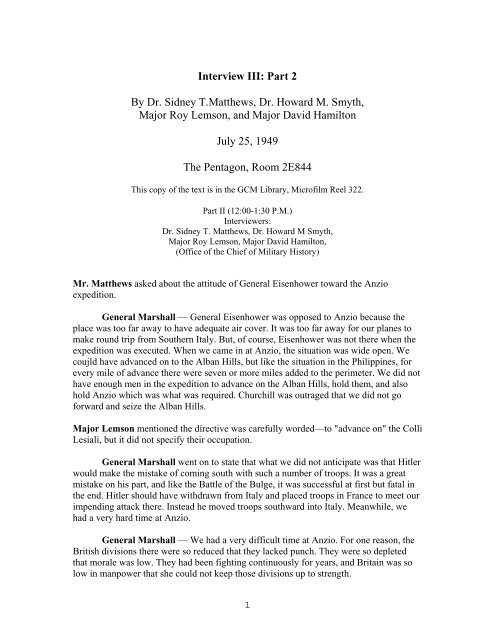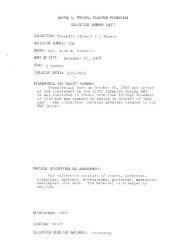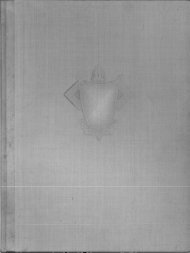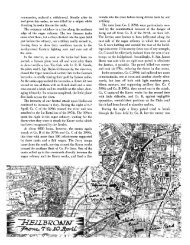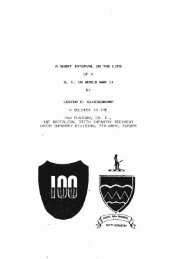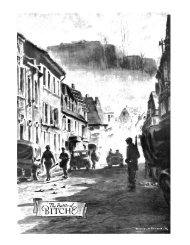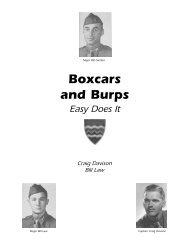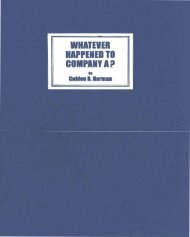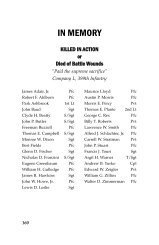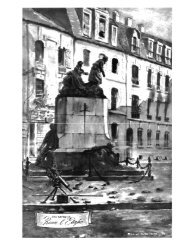July 25, 1949 - The George C. Marshall Foundation
July 25, 1949 - The George C. Marshall Foundation
July 25, 1949 - The George C. Marshall Foundation
You also want an ePaper? Increase the reach of your titles
YUMPU automatically turns print PDFs into web optimized ePapers that Google loves.
Interview III: Part 2<br />
By Dr. Sidney T.Matthews, Dr. Howard M. Smyth,<br />
Major Roy Lemson, and Major David Hamilton<br />
<strong>July</strong> <strong>25</strong>, <strong>1949</strong><br />
<strong>The</strong> Pentagon, Room 2E844<br />
This copy of the text is in the GCM Library, Microfilm Reel 322.<br />
Part II (12:00-1:30 P.M.)<br />
Interviewers:<br />
Dr. Sidney T. Matthews, Dr. Howard M Smyth,<br />
Major Roy Lemson, Major David Hamilton,<br />
(Office of the Chief of Military History)<br />
Mr. Matthews asked about the attitude of General Eisenhower toward the Anzio<br />
expedition.<br />
General <strong>Marshall</strong> — General Eisenhower was opposed to Anzio because the<br />
place was too far away to have adequate air cover. It was too far away for our planes to<br />
make round trip from Southern Italy. But, of course, Eisenhower was not there when the<br />
expedition was executed. When we came in at Anzio, the situation was wide open. We<br />
coujld have advanced on to the Alban Hills, but like the situation in the Philippines, for<br />
every mile of advance there were seven or more miles added to the perimeter. We did not<br />
have enough men in the expedition to advance on the Alban Hills, hold them, and also<br />
hold Anzio which was what was required. Churchill was outraged that we did not go<br />
forward and seize the Alban Hills.<br />
Major Lemson mentioned the directive was carefully worded—to "advance on" the Colli<br />
Lesiali, but it did not specify their occupation.<br />
General <strong>Marshall</strong> went on to state that what we did not anticipate was that Hitler<br />
would make the mistake of coming south with such a number of troops. It was a great<br />
mistake on his part, and like the Battle of the Bulge, it was successful at first but fatal in<br />
the end. Hitler should have withdrawn from Italy and placed troops in France to meet our<br />
impending attack there. Instead he moved troops southward into Italy. Meanwhile, we<br />
had a very hard time at Anzio.<br />
General <strong>Marshall</strong> — We had a very difficult time at Anzio. For one reason, the<br />
British divisions there were so reduced that they lacked punch. <strong>The</strong>y were so depleted<br />
that morale was low. <strong>The</strong>y had been fighting continuously for years, and Britain was so<br />
low in manpower that she could not keep those divisions up to strength.<br />
1
El Alamein meant a very great deal to the British: it gave a tremendous lift to their<br />
morale. Up to that time the Eighth Army had suffered many defeats and they lacked<br />
confidence. Like Sheridan's victory at Winchester during the Civil War, it gave a great<br />
boost to morale but was blown up out of proportion to its importance. But in Italy, the<br />
fighting spirit and aggressive quality of British divisions began again to decline, and for<br />
the reason of the sheer factor of exhaustion. <strong>The</strong> British simply could not keep their<br />
battalions up to strength and it was very depressing to their men. <strong>The</strong>y had no<br />
replacements. <strong>The</strong> two British divisions at Anzio simply had no punch: it was a very<br />
serious situation.<br />
Dr. Matthews — But Alexander expected the initial force to push right up to the Alban<br />
Hills.<br />
General <strong>Marshall</strong> — What did General Clark say on this point?<br />
Dr. Matthews — Clark was not enthused regarding Anzio but he went along with it.<br />
General <strong>Marshall</strong> — I imagine General Clark at present is most cautious and<br />
careful not to appear to criticize the British.<br />
At the time of Kasserine Pass, when the British had had a great lift in their morale<br />
as a result of El Alamein, Alexander could with some grace make some uncomplimentary<br />
remarks about the quality of American troops. But as a matter of fact, part of the<br />
difficulty was faulty dispositions of the British commander, Anderson. Anderson, by the<br />
way, appealed to me to save his command, saying he would do anything I told him. (Dr.<br />
Matthews interjected, Alexander admits faulty dispositions of Anderson.) But in Italy the<br />
situation was quite the other way. <strong>The</strong> American troops had learned, and the British<br />
divisions were exhausted; they had no fight left in them. <strong>The</strong> situation was now flowing<br />
the other way with American divisions improving and British deteriorating.<br />
General <strong>Marshall</strong> — In North Africa, a bad situation was developing in the rear.<br />
When I went to North Africa (at the time of the Casablanca Conference?) I found that Ike<br />
was about in tears over the situation and that Beedle Smith had been unable to get away<br />
from Algiers to the front until four days before I arrived there. General Smith tried to get<br />
a look but his chauffeur was shot, he rolled into a ditch, and while he moved around the<br />
front some, he couldn't see much in the limited time he had. I wanted to use Bradley to<br />
straighten out this mess in the rear, but Ike sent Bradley up to the front, and then I sent<br />
General Bull but he too was sent up to the front. <strong>The</strong> mess was developing at the rear. I<br />
wanted to have the thing straightened out before a scandal developed. General <strong>Marshall</strong><br />
spike especially about the bad situation at the officers replacement depot at Oran and<br />
wanted to do something about it before a scandal developed there.<br />
Patton at this time showed great restraint after he took command of II Corps in<br />
Tunisia. He wanted to dart in—thought that destiny had delivered Rommel to him. Ike<br />
sent Bradley up to II Corps as Deputy Commander to restrain Patton when Ike and I<br />
2
thought might need restraint. Also, Bradley was expected to take over II Corps when<br />
Patton had to be pulled out for the Seventh Army which was to go into Sicily. I had<br />
deliberately passed over Bradley for promotion three times so that he could remain with<br />
the 28th (Penn.) Division in order to train it and get it into good combat condition.<br />
McNair had recommended Bradley three times for a higher command and each time I had<br />
said "no" for this reason.<br />
General <strong>Marshall</strong> — In Clark's river crossings there was a great deal of<br />
difficulty caused by the change in the draft laws here at home which resulted in our being<br />
short about 300,000 men. This had effects all along the line. It cut down on replacements,<br />
it cut down the training period, and in the field it cut down the periods of leave for the<br />
men. Shortened and reduced leave, and lack of replacements affected morale of the<br />
divisions whose men later criticized Clark for the Rapido River crossings. (It was not<br />
clear exactly which crossings General <strong>Marshall</strong> had in mind: the Rapido crossings which<br />
provoked the later protests, or the Volturno crossings.) When you can rejuvenate and<br />
refresh your divisions and keep them up to full strength, battle morale is much better. But<br />
the river crossings were made just at a time when other factors affected morale. General<br />
Clark is greatly to be admired that he took it on the chin, and did not complain about the<br />
fact that we didn't send replacements. General Clark was an able aggressive fighter.<br />
General <strong>Marshall</strong> — At Anzio feelings were greatly aroused over the question of<br />
artillery. <strong>The</strong> Germans had their big gun (Anzio Annie) and our troops did not have<br />
heavy artillery. As a matter of fact up to this time our field commanders had not wanted<br />
heavy artillery. I had to struggle to get some heavy artillery accepted. <strong>The</strong> theory was that<br />
this was a war of movement, and only light artillery which could quickly be moved was<br />
wanted. At the time of Anzio our commanders began yelling for heavy artillery. <strong>The</strong><br />
squabble here in the U.S. when I was called on the carpet (I was under investigation<br />
myself) had its origin right there in Anzio. Much was fomenting at the time of the Anzio<br />
expedition. <strong>Marshall</strong> said that he had to pay heed to General Truscott, re heavy artillery<br />
because Truscott was a fighting commander.<br />
American tanks were more maneuverable than Germans. We could not have made<br />
the pursuit across France without that type of tank. <strong>The</strong> German heavy tank needed<br />
special budging.<br />
General <strong>Marshall</strong> — British spirit greatly deteriorated at Anzio and this for<br />
reason of sheer exhaustion. Those divisions of our, particularly the 45th Division from<br />
Oklahoma, the 30th Div. and around Cisterna and breaking out of the beachhead and<br />
Frederick's 1SSF Division fought wonderfully. <strong>The</strong>n came 11 May, which was a great<br />
psychological turning point. We put in two new divisions, the 85th and 88th. This was<br />
new in that these divisions had had the normal development and full training, the<br />
development which General Clark himself had worked out in detail over here. This was<br />
the first real test of our system. Furthermore, we had replacement depots close to the<br />
front and were able to keep our divisions up to full strength. Meanwhile over here I had<br />
had my fight with Senator Wheeler and had got hold of the 18-year-olds. <strong>The</strong> way those<br />
two new and inexperienced divisions behaved was a great surprise to the Germans. But it<br />
3
happened so fast that they did not wholly appreciate the significance of the experience.<br />
Those beautifully trained divisions gave a splendid performance. On May 11th those new<br />
divisions rushed right up the side of the mountain, and they provoked a large German<br />
retreat. Had it been Italians instead of Germans, there would not have been any<br />
reorganization, and probably not if they had been French. <strong>The</strong> fact that despite the big<br />
retreat the Germans were able to reorganize is a high tribute to the discipline of their<br />
army. <strong>The</strong> Germans did not, however, fully appreciate what had happened; that it was<br />
these now fully trained divisions, 85th & 88th, which had carried the burden. Otherwise<br />
the Germans would have acted differently in France and anticipated the high quality of<br />
new American troops.<br />
At this time in Italy General Alexander still believed that American troops lacked<br />
quality. <strong>The</strong> Germans at this time should have reduced their strength in Italy and<br />
increased their strength in France. <strong>The</strong> performance of the 85th & 88th Divisions was<br />
significant because it was a reassurance to me as showing what was to come in<br />
Normandy.<br />
By now our replacement system was working the way it was designed to work,<br />
the way it should work. What I wanted was to have every division up to 100% strength<br />
each night. <strong>The</strong> important thing was to have the trained men there. In addition to the first<br />
important fact, i.e., the excellent record of the two new GI divisions, the 85th and the<br />
88th, General <strong>Marshall</strong> pointed out that the second noteworthy feature of the May drive<br />
in Italy was the working of the new replacement system in Italy. He explained that this<br />
was the replacement system which he had fought for in the States, which kept the depots<br />
immediately to the rear of combat and replaced losses daily. In the Civil War we could<br />
not do this, and we had battalions with company strength. <strong>The</strong>n they raised new<br />
battalions, this because the system gave new commissions for raising new units and the<br />
officers would profit in commissions. I had been having my battles at this time with the<br />
War Production Board (Nelson's office) and with McNutt, War Manpower Commission.<br />
Charles Wilson (G.E.) supported me. I wanted trained replacements, ready to take places.<br />
<strong>The</strong> British could not do this, because of their territorial system. Full strength of a unit is<br />
essential in order to keep up its morale.<br />
We did make rather intelligent use of manpower. We used women, we used<br />
WACS, and accomplished a great deal to do some tasks with women in order to get men<br />
in front lines. But each time something new like WACS was proposed there was protest<br />
from traditionalists. I got tired of people in the army who were opposing change just<br />
because it was new. We were able to show the British a thing or two in the use of<br />
manpower. I showed Anthony Eden a woman trainer at an airplane factory, propeller<br />
assembly at Biloxi, Mississippi, giving instruction to newcomers. How long had she been<br />
at it? About 10 months. I asked her occupation earlier. She was a music teacher. Eden<br />
threw his hands up then.<br />
<strong>The</strong> need of keeping units up to strength by the system of replacements was<br />
impressed on my mind when I was a young fellow at Command School at Leavenworth.<br />
General Morrison spoke of his observations at the battle of Lo Yang, seeing the<br />
4
eplacements in the rear. This is fundamental to keep units up to strength. In China I<br />
wished to train men south of the Yangtze. <strong>The</strong>y were putting a Chinese boy⎯who had<br />
never been out of his village⎯directly into combat after 2 days. It is a great change for<br />
any man to come into the army. I wanted to reduce the number of Chinese divisions, and<br />
keep them up to strength by a system of trained replacements. <strong>The</strong> only real trained<br />
divisions the Chinese had were those that Stilwell trained in India.<br />
Dr. Matthews — How far up the Italian Peninsula did you wish us to go? Did you wish<br />
to go as far as the Pisa-Rimini Line?<br />
General <strong>Marshall</strong> in reply to the specific question by Dr. Matthews said he<br />
wished to go on in Italy at least until the fronts were joined up, that is Anzio Beachhead<br />
front (VI Corps) and the rest of the Army and to capture Rome. General <strong>Marshall</strong> wanted<br />
to go a little beyond Rome, but he said he had seen no compelling strategic reason for<br />
pushing the Germans back to the Pisa-Rimini Line. But General <strong>Marshall</strong> said "No one<br />
would stop a great pursuit unless it led to a great weakness".<br />
At the Cairo Conference there were two main questions: (1) the Rhodes Operation<br />
and (2) the 26LST's. <strong>The</strong> P.M. wished to go into Rhodes. I was determined not to do this<br />
because it would divert strength from the main effort of OVERLORD. At Cairo the other<br />
major battle was over 26 LST's. If at that time we had had 50 more LST's we might have<br />
been able to shorten the war by 6 months. <strong>The</strong> Prime Minister had his political motives<br />
for wishing to go into the Balkans. As soon as Eisenhower left the Mediterranean and<br />
control in the Mediterranean passed into British hands, Churchill pressed and pressed for<br />
offensives there. General Alexander was Churchill's man.<br />
Bevin later said to me "I agree with everything you did as Chief of Staff, but why<br />
did you not go into the Balkans?"<br />
I replied, "Mr. Bevin, what do you know about shipping?" He replied, "Not<br />
much." I asked again, "How much do you really know about the shipping problem." He<br />
admitted he did not know it.<br />
Even with the port of Antwerp in N.W. Europe we had a difficult time supplying<br />
our armies in France. Supplying of great armies in the Balkans would have been an<br />
insoluble problem.<br />
<strong>The</strong>re was also difficulty of terrain which in the Balkans was worse than in Italy.<br />
In another connection General <strong>Marshall</strong> mentioned that his main opposition to a<br />
move in the Balkans was that it was a diversion from the main effort, N.W. Europe.<br />
In dealing with the British, they always spoke, in conferences with us, on policy.<br />
With their parliamentary traditions and experience with the cabinet system, they are<br />
accustomed to speaking in accordance with a policy. Churchill quite largely controlled<br />
what the British said. <strong>The</strong>y did not give you their own individual views. Once I had the<br />
5
experience after a meeting where they all said the same thing that one came to me to<br />
explain what he really believed. But in conferences it was the leaders who spoke. Dill<br />
often did not say a word. Mountbatten often said nothing even about those things which<br />
he himself had investigated.<br />
Dr. Matthews — What was your attitude toward the expedition (ANVIL) into Southern<br />
France?<br />
General <strong>Marshall</strong> — <strong>The</strong> operation in Southern France I had always considered<br />
necessary because I did not want Eisenhower's right flank to be in the air. But we<br />
particularly needed the ports of Southern France, Marseilles and Toulon. Although we<br />
captured ports such as Cherbourg, we had not correctly anticipated in our early planning<br />
for OVERLORD how effectively the Germans would lock up the ports and prevent our<br />
using them for a long period after we captured them. General <strong>Marshall</strong> said that the need<br />
for additional ports to bring additional divisions into France was not fully appreciated<br />
early in the OVERLORD planning but this became more apparent as the operation<br />
developed. <strong>The</strong> British rather opposed Southern France all along. In the files there is a<br />
memorandum—one prepared for me by my staff but which I never used, called<br />
"Castigation of Anvil". It gives statistics, what the British (particularly Churchill) had<br />
said earlier about ANVIL, point by point, how far they had been mistaken. This was in<br />
tended for use against the British when I anticipated they would opposed advance to the<br />
Rhine (advance on a broad front).(Major Hamilton mentioned that he believed he had<br />
seen the memorandum in the files.)<br />
Dr. Matthews — How important in the discussions with the British regarding ANVIL<br />
was the agreement with Stalin?<br />
General <strong>Marshall</strong> — It was useful, but it was not the chief argument. <strong>The</strong> chief<br />
argument for ANVIL was the necessity to support OVERLORD. This was the dominant<br />
reason. Nevertheless the agreement with Stalin was a serious thing. <strong>The</strong> Russians were<br />
quite scrupulous about keeping their military agreements. <strong>Marshall</strong> said that he never<br />
knew them to fail to keep a military agreement.<br />
Dr. Matthews — What was the attitude of Roosevelt and Stalin at Teheran?<br />
General <strong>Marshall</strong> — <strong>The</strong> agreement with Stalin at Teheran was convenient for<br />
use against the British. Another very important consideration in <strong>Marshall</strong>'s mind in favor<br />
of ANVIL was the need for additional ports through which to introduce new divisions,<br />
from U.S. with which to support OVERLORD. Another important argument was the fact<br />
that ANVIL offered the best strategic use of the resources of the Mediterranean. <strong>The</strong><br />
Russians at this time were not particularly interested in the Balkans but were primarily<br />
concerned at getting as much as possible in OVERLORD.<br />
Although I was aware of the British desire for support in the Eastern<br />
Mediterranean, I did not support ANVIL because of any desire to forestall a British<br />
request for support in the eastern Mediterranean.<br />
6
<strong>Marshall</strong> said that ANVIL was the best means of getting the new French divisions<br />
into France, but said this was not a controlling factor as they might have been brought<br />
into OVERLORD anyway.<br />
Stalin kept asking who was to be commander of OVERLORD. He kept asking<br />
this. Strictly speaking this was none of his business. He could have been given a guaranty<br />
about the operation and told that U. S. and Great Britain would name the commander.<br />
Stalin of course knew of the discussion about the commander. Stalin knew I had been<br />
proposed. <strong>The</strong>re was nothing very secret about this. That towsel-headed British Minister<br />
of Propaganda [Brendan-Bracken] had congratulated me on my nomination—this in front<br />
of the elevator operator.<br />
At the Teheran Conference Stalin tried to make sure that the Allies would carry<br />
out OVERLORD. He tried to do this by (1) getting the U. S. and Britain to set a definite<br />
date for the operation and (2) getting U.S. and Britain to name a commander for<br />
OVERLORD. At the time Stalin knew <strong>Marshall</strong> was a strong advocate of OVERLORD<br />
and that he had been selected for the command. <strong>Marshall</strong> said that Stalin knew that<br />
Churchill was opposed to the operation and that Stalin didn't understand why Roosevelt<br />
was holding back on the operation. Stalin felt therefore that if <strong>Marshall</strong> were officially<br />
named as the commander for the operation the chances of its being carried out would be<br />
greatly increased.<br />
But Churchill opposed going into Southern France, opposed it almost to the very<br />
last, and then rode in with them, which was quite a stunt, giving those two fingers—"V"<br />
for victory. Up to one month before OVERLORD Churchill talked about 500,000 corpses<br />
in the Channel if we carried out OVERLORD, and then went all out for it and tried to go<br />
along on the D-Day assault convoy. With Churchill, it was a political thing, wanting to go<br />
into the Balkans. Churchill—this must be said to his credit—sized up the Russians<br />
correctly much earlier than did the others—the rest of us. Churchill wished to go into the<br />
Balkans for political reasons. For us it was simply a problem of winning the war as<br />
rapidly as possible. This because the American people would not stand for a long drawn<br />
out war with mounting casualties. We Americans looked at the war as a military problem:<br />
going into the Balkans would have meant six months or more of additional fighting. In<br />
addition there was this factor for the British, that Alexander would have commanded an<br />
expedition into the Balkans.<br />
He reminded us that in the European War he was always concerned with four<br />
factors: (1) Casualties, (2) Duration, (3) Expense, and (4) the Pacific. <strong>The</strong> Pacific could<br />
not be left waiting indefinitely. "We had to go ahead brutally fast" in Europe. We could<br />
not indulge in a Seven Years' War. A king can perhaps do that, but you cannot have such<br />
a protracted struggle in a democracy in the face of mounting casualties. I thought that the<br />
only place to achieve a positive and rapid military decision was in the lowlands of<br />
Northwestern Europe. Speed was an essential.<br />
7
In estimating the strategy of the war in Europe and Italy we must take into<br />
account Hitler's faulty moves and weigh them against the disadvantages attached to our<br />
strategy. He made the same mistake in Italy as in Northern France. His staff wished him<br />
to draw back. Had he drawn back rapidly to the Rhine, this would have created<br />
extraordinarily difficult problems for us. In Italy it was the same mistake of not drawing<br />
back the way his staff wanted him to. Hitler made a terrible mistake in forcing his<br />
generals to fight south of the Po. Hitler might have created great difficulties by<br />
withdrawing in France. I myself dreaded the crossing of the Roer and the advance to the<br />
Rhine more than any other operation during the war. <strong>The</strong> terrain there was very difficult.<br />
In fact I dreaded crossing of the Roer more than the cross-Channel attack. I was certain<br />
that we would get across the Channel. <strong>Marshall</strong> dreaded most the advance to the Rhine,<br />
the attrition of a slow, plugging advance. <strong>The</strong> Rhine might have been a great obstacle if<br />
the Germans had withdrawn to it promptly. We were lucky to get the Remagen Bridge,<br />
but to seize a bridgehead, you have to get up to it. <strong>The</strong> British did not want Eisenhower to<br />
cross in the center. <strong>The</strong>y favored making a single heavy drive in the North in the British<br />
zone of advance. Patton and Bradley wished to strike through the center.<br />
It was at this period that I was forced to speak quite frankly in CCS to the British.<br />
<strong>The</strong>y had begun to criticize a pernicious personal influence exerted on Eisenhower by<br />
Bradley and Patton. I said that the real influence which was constantly being brought to<br />
bear on Eisenhower, the Combined Commander, was the direct influence of Churchill<br />
and Alan Brooke. <strong>The</strong>y were seeing him every week, and not going through the<br />
Combined Chiefs of Staff. We here in Washington were playing according to the rules.<br />
This protest on my part stopped that criticism by the British. At this point, General<br />
<strong>Marshall</strong> remarked that he was getting away from the Italian campaign and so he would<br />
return to it.<br />
General <strong>Marshall</strong> — <strong>The</strong> next important thing regarding Fifth Army was the<br />
speech by Claire Luce referring to the "forgotten men" of the Fifth Army. Fifth Army<br />
morale was almost ruined from home—thousands of letters came in—by the press<br />
campaign here, calling it the "forgotten army." When a soldier begins feeling sorry for<br />
himself he is done for as a fighting man.<br />
In Italy, and this was important, we had three experimental divisions and also the<br />
10th Mountain Division. Among our officers there was great opposition to anything that<br />
was not standard. <strong>The</strong>y wanted all divisions uniform, so that all would be mathematically<br />
alike. But you do not win a war with arithmetic, though you need a little arithmetic. At<br />
this point General <strong>Marshall</strong> outlined several changes that had been made in the light<br />
division and stated that the 10th Mt. Div. was the only mountain division to emerge. In<br />
the fall of 1944 General <strong>Marshall</strong> offered the 10th Mt. Div. To General Eisenhower but<br />
he refused it unless it were reorganized as a standard infantry division. When <strong>Marshall</strong><br />
got this message he concluded that if Eisenhower didn't want the division unless it was<br />
reorganized he didn't need it. <strong>Marshall</strong> then sent a message to Clark offering it to him. As<br />
C/S to McNair Clark had a lot to do with training of the 10th Mt. Div. And he replied<br />
within 30 minutes that he would be glad to get the 10th Mt. Div. Although our men<br />
wanted uniformity of type for ease in mathematical figuring, the Germans were doing<br />
8
pretty well with 8 different types of divisions. A little later, toward the end of the battle of<br />
the Bulge General <strong>Marshall</strong> met General Eisenhower in Southern France. At that time<br />
General Eisenhower sounded <strong>Marshall</strong> out about the 10th Mt. Div. But didn't want to ask<br />
for it if he were going to be refused. When <strong>Marshall</strong> heard that Ike now wanted the 10th<br />
Mt. Div he said to Ike, "Why, you're inconsistent, Eisenhower. I offered you the 10th Mt.<br />
Div and you said you didn't want it and now you say you do want it." <strong>Marshall</strong> then<br />
pointed out to Ike that he had then offered it to Clark and he had accepted it right away.<br />
<strong>Marshall</strong> told Ike, "You can't have it now". Ike had said to <strong>Marshall</strong> at the time of the<br />
meeting in Southern France that he didn't know anything about turning down <strong>Marshall</strong>'s<br />
offer of the 10th Mt. Div. Ike called in General Bull, his G-3, then and Bull, very redfaced,<br />
said that the decision to turn down the offer of the 10th Mt. Div had been taken in<br />
his section. Apparently, <strong>Marshall</strong> said, Eisenhower had not known of Bull's action. That's<br />
how the 10th Mt. Div. got to Italy.<br />
<strong>The</strong> 10th Mt. Div proved very useful in Italy. It practically converted a secondary<br />
attack into a main attack in the spring 1945 drive. <strong>The</strong> commander of this Division was<br />
one whom I selected. I greatly admired him — General Hayes. During World War I, in<br />
the course of terrific artillery bombardment he three times rode on a horse through a<br />
barrage in order to get the targets for his artillery. He won the Congressional Medal for<br />
this. <strong>Marshall</strong> had always admired his courage for this act. <strong>Marshall</strong> had found General<br />
Hayes in ETO with his artillery (2nd Div. Arty. Co). He was a very quiet fellow.<br />
<strong>Marshall</strong> had pulled him out and sent him to command the 10th Mt. Div. when it went<br />
overseas. Hayes was hard on his brigadiers—had about three of them killed or wounded,<br />
<strong>Marshall</strong> said. (1 KIA & 1 wounded actually).<br />
General <strong>Marshall</strong> mentioned that General Clark was a very able commander—a<br />
good organizer, a man who took unfair criticism with dignified silence (on the chin).<br />
Also, he was an aggressive fighter, and kept pushing. This is the only thing to do—not in<br />
a bull-headed way—but with intelligent vigor. But I don't go along with his publicity.<br />
I was there (Serchio Velley) with General Clark at the time of the fiasco of the<br />
92nd Division, the Negro troops which simply refused to fight. Officers completely lost<br />
control over the men. <strong>The</strong> will to fight was completely lacking. At this time I made a<br />
dicker—a wager with Clark: that he could take those 3 regiments of the 92nd Division<br />
and form one regiment out of them, take the one regiment made up of AAA troops who<br />
had already been converted to infantry and I would bring back the Japanese regiment, the<br />
442nd from Southern France. He was to put the Negroes in front and the Japs in reserve<br />
behind them. <strong>The</strong> Germans would think the Negro regiment was a weak spot, and then<br />
would hit the Japs. <strong>The</strong> Japanese regiment was spectacular. It was very important for the<br />
future of Japanese population in California that these troops be given active service. I<br />
fought for this. Also, there was great opposition to decorations being given these men<br />
because of jealousy from other outfits. I fought for this also, and forced this on General<br />
Clark. "If you don't decorate them, I will", but it was better for Clark to do it.<br />
<strong>Marshall</strong> mentioned the 2nd Cavalry Division (Negro). Its leadership was not<br />
good, but there was a Lt. Col. In the outfit whom <strong>Marshall</strong> knew was one man who could<br />
9
do something with it and was qualified to be its commander. So this Lt. Col. was made a<br />
Col., then a Brigadier two months later and took over the outfit. He took the division to<br />
North Africa, as a result of circumstances over which this commander had no control (i.e.<br />
the need for service troops for ANVIL). <strong>Marshall</strong> decided the 2nd Cavalry would have to<br />
be broken up. <strong>The</strong> commander was very much upset by this. So <strong>Marshall</strong> made him<br />
commander of the Rome garrison which was quite a thing, <strong>Marshall</strong> said, for an<br />
Oklahoma boy. Soon after he took over command of Rome, a need developed for a good<br />
man to go to the 93rd Division to help straighten it out, which was then on Bougainville.<br />
<strong>The</strong> men of the 93rd wouldn't fight—couldn't get them out of the caves to fight. This<br />
officer went over and did as much as anyone could do in that situation but couldn't at that<br />
stage make that outfit a first-class combat division. <strong>Marshall</strong> then told what happened to<br />
this officer in private life later, etc.<br />
Dr. Matthews — Why did the British give such a high priority to Italy?<br />
General <strong>Marshall</strong> — It was partly political, but partly because of their sincere<br />
belief in that strategy. But once you start on attrition you are lost, you are ruined. General<br />
Clark kept pushing the fighting, and rightly so. If you keep the initiative, total losses are<br />
less than with the accumulation of losses in a campaign of attrition. At Anzio, one<br />
difficulty was that the British divisions had lost their punch, due to sheer exhaustion. <strong>The</strong><br />
British had no replacements. General Clark never complained to me about the British but<br />
other officers did mention this British slowness to me.<br />
In connection with casualties General <strong>Marshall</strong> said that frequently one has to<br />
take heavy casualties initially in order to save heavier casualties later. He explained that<br />
attrition was the most deadly factor in modern war, that it was best to take one's losses<br />
early and then speed forward as the Germans tried to do during this war. He cited the case<br />
of the leading battalion of the 16th Infantry (1st Div) which landed in Normandy. <strong>The</strong><br />
battalion suffered heavy casualties in the initial fighting but the casualties of the Division<br />
were very light as a whole. Of course, he said, you could never tell a member of that<br />
battalion that the Division's losses were light in that battle but the fact was that the heavy<br />
losses suffered in the first day's fighting by that battalion saved much heavier casualties<br />
in the whole Division. General <strong>Marshall</strong> expected greater losses in the Normandy<br />
landings than we sustained but felt that we could keep sending in more forces until the<br />
German defenses were broken.<br />
Major Hamilton asked about the nomination of General patch as commander of Seventh<br />
Army.<br />
General <strong>Marshall</strong> did not remember much and said the choice was probably<br />
made in the theater. <strong>Marshall</strong> said that he had known Patch as a lieutenant in World War<br />
I, that he had a good record but <strong>Marshall</strong> said he had never understood Patch. <strong>Marshall</strong><br />
said he was disturbed by the low efficiency report which General Patch turned in on<br />
General Joe Collins on Guadalcanal. <strong>Marshall</strong> said that he had personally known Collins<br />
a long time and had a high opinion of him and had in fact marked him for a high<br />
command in the ETO and that he (<strong>Marshall</strong>) had sent Collins to Eisenhower. (<strong>The</strong><br />
10
implication of what <strong>Marshall</strong> said about Patch was that Patch's low efficiency report on<br />
Collins had had the effect on <strong>Marshall</strong> of making him wonder about Patch, not about<br />
Collins.)<br />
Dr. Matthews asked General <strong>Marshall</strong> regarding General Alexander.<br />
General <strong>Marshall</strong> mentioned that General Alexander was held in high regard by<br />
a great many American officers who were closely associated with him. At the time of the<br />
Kasserine Pass, General Alexander spoke rather patronizingly of American troops. He<br />
continued to have this attitude long after the situation had radically changed, and when<br />
American troops in Italy had to bear the brunt of the fighting because of exhaustion of the<br />
British divisions. At Yalta (?) Alexander remarked to me: "Of course your American<br />
troops are basically trained." I said, "Yes, American troops start out and make every<br />
possible mistake, But after the first time they do not repeat these mistakes. <strong>The</strong> British<br />
troops start out in the same way and continue making the same mistakes over and over,<br />
for a year". <strong>The</strong> Prime Minister was with us and quickly changed the subject. This<br />
patronizing attitude toward American troops was rather widespread in English circles. On<br />
one occasion the King started telling me how fine it was to have Eisenhower in nominal<br />
supreme command with Montgomery at his side, etc. I replied, "That's very interesting,<br />
Your Majesty", and went on.<br />
Dr. Matthews asked about the attitude of President Roosevelt toward Italy and the<br />
Balkans.<br />
General <strong>Marshall</strong> replied that President Roosevelt was opposed to our going into<br />
the Balkans. But then he would meet with the British and begin talking about the<br />
Balkans. <strong>Marshall</strong> said he was always worried about whether President Roosevelt might<br />
at such times commit us to operations in the Balkans by loose talk (though <strong>Marshall</strong> did<br />
not use the words "loose talk," it war obvious that was what he meant). "When President<br />
Roosevelt began waving his cigarette holder you never knew where you were going."<br />
General <strong>Marshall</strong> said that he was open to criticism by the British on the<br />
question of intervention in Greece. As Chief of Staff he had opposed U. S. taking any<br />
part in the intervention which the British made in Greece during the war (1944).<br />
Churchill had gone in under fire into Athens at the time. <strong>The</strong>n, after he became Secretary<br />
of State, <strong>Marshall</strong> had supported U. S. intervention in Greece.<br />
Dr. Matthews — What attitude did Admiral King, Admiral Leahy and General Arnold<br />
take regarding Allied strategy in the Mediterranean?<br />
General <strong>Marshall</strong> stated that as far as the other American members of the Chiefs<br />
of Staff—Leahy, King and Arnold—they were generally in support of the strategical<br />
position which <strong>Marshall</strong> took re the Mediterranean. <strong>The</strong> only differences occurred when<br />
the Navy would want some support for the Pacific. <strong>Marshall</strong> admitted that he had<br />
fashioned the strategy of the U. S. chiefs as it related to Europe and the Mediterranean<br />
11
and that in effect the other members of the U. S. Chiefs had supported—and strongly<br />
supported his views.<br />
Miscellaneous Points<br />
In connection with Anzio and General Lucas, Dr. Matthews mentioned the<br />
Americans on the spot did not take the same view that General Alexander did about the<br />
Beachhead objective—that this appeared clearly in General Lucas's diary. General<br />
<strong>Marshall</strong> expressed great surprise that Lucas had kept a diary and indicated that a field<br />
commander should not keep a diary. Dr. Matthews pointed out that such a contemporary<br />
record was invaluable to the historian. General <strong>Marshall</strong> exploded at the point and said<br />
that the primary job of the commander was the successful conduct of those operations,<br />
not keeping a record of them. He should have this in mind in the future (on operations—<br />
present and future), and not on the past".<br />
General <strong>Marshall</strong> said that the commanders of the various British services (i.e.<br />
air, ground, navy) were jealous of the power of each other and for that reason it was<br />
always easier to get them all to accept Eisenhower as the supreme commander over them<br />
all.<br />
General <strong>Marshall</strong> pointed out that in a democracy in wartime the conduct of the<br />
war cannot be carried on independent of political considerations. In other words, he said<br />
attention has to be given to both military and political considerations. Both are necessary<br />
to win the war in a democracy.<br />
Dr. Matthews asked "Do you think the British attempted to use the proposed Southern<br />
France operation as a means of securing additional resources for the Mediterranean<br />
<strong>The</strong>ater, although they never seriously considered actually invading Southern France?"<br />
General <strong>Marshall</strong> replied that he felt that this was the case. He said that's what<br />
the British always were doing.<br />
General <strong>Marshall</strong> did not have much to say about his visit to 6th Army Group on<br />
the operations there (in the fall or winter 1944). He considered the German<br />
"demonstrations" there at the time of the Bulge battle as a "superb example" of the use of<br />
demonstrations to draw attention and opposition from the main attack.<br />
General <strong>Marshall</strong> admitted that he was always fearful that the operations in the<br />
Mediterranean would suck troops in there away from Northern France where we should<br />
make the main effort. He admitted that once we were committed there, including Italy, it<br />
was very difficult to pull out.<br />
Dr. Matthews asked about General <strong>Marshall</strong>'s feeling that the Germans would withdraw<br />
some divisions in Italy to Northern France and would then fight a delaying action to the<br />
Pisa-Rimini line.<br />
12
General <strong>Marshall</strong> replied that he had felt that way before the spring (May 1944)<br />
offensive had gotten underway. General <strong>Marshall</strong> had based this feeling apparently on<br />
what the Germans were capable of doing and what <strong>Marshall</strong> thought logically was the<br />
best course of action for the Germans. He did not indicate that he had any special<br />
intelligence information which led him to this opinion. (This is a point to be checked<br />
again with General <strong>Marshall</strong>.)<br />
In his comments on the May 1944 drive in Italy General <strong>Marshall</strong> did not mention<br />
the French performance and seemed unaware of the FEC's major breakthrough effort.<br />
As we talked with General <strong>Marshall</strong> we all received a fine impression of the man.<br />
He spoke directly, quickly, effectively and easily and with an air of dignity. Never at any<br />
time during the interview was there anything but complete frankness about the questions<br />
on which he talked. <strong>The</strong> very remarks he made left us all keenly aware of the great task<br />
he had during the war and the superlative manner in which he had carried on the war. <strong>The</strong><br />
interviews were rambling, but only because one point would remind General <strong>Marshall</strong> of<br />
something else and he would flash on to that. It was obvious that he could see the big<br />
picture and could see the smaller pictures on the local scenes as well. Instead of sticking<br />
to the questions which we had prepared, it was found much more useful to start him off<br />
and let him carry the ball. His discursive remarks were most useful because he brought so<br />
much into what he said which we never would have gotten by sticking religiously to<br />
specific questions. From the nearly three-hours' discussion the impression emerged of a<br />
great general with a remarkable memory and for ability to get to the heart of the question.<br />
Specific questions brought out important points which had not been included. It was<br />
found, however, that it was unwise to interrupt General <strong>Marshall</strong> until he had finished<br />
with one train of thought. He seemed in good physical shape and looked well, contrary to<br />
pictures taken after his illness.<br />
<strong>The</strong> interview was interrupted by General <strong>Marshall</strong> when his old M/Sgt. came in<br />
to announce that the car was ready to go to the White House. General <strong>Marshall</strong> asked his<br />
man how long it would take to get to the White House. He was told how many minutes it<br />
would take and said, "Gentlemen, I can give you three more minutes." He then continued<br />
to talk for three minutes about the Anzio operation and then said, "Gentlemen, excuse<br />
me. I have to go now". He thereupon walked out of the room followed by the three<br />
historians. Thirty minutes later we received another call to see General <strong>Marshall</strong> and the<br />
interview was resumed.<br />
General <strong>Marshall</strong> has a sense of humor and flashes of it were apparent at different<br />
states of the interview. His language was rich with the expressions of the soldier.<br />
As we entered his office at 1000 General <strong>Marshall</strong> was seated as his desk writing<br />
a letter. He told us just to have a seat. He said that during the war he had found that if you<br />
let the letter wait it usually didn't get finished, and that it was better to keep people<br />
waiting until you finished the letter.<br />
13


